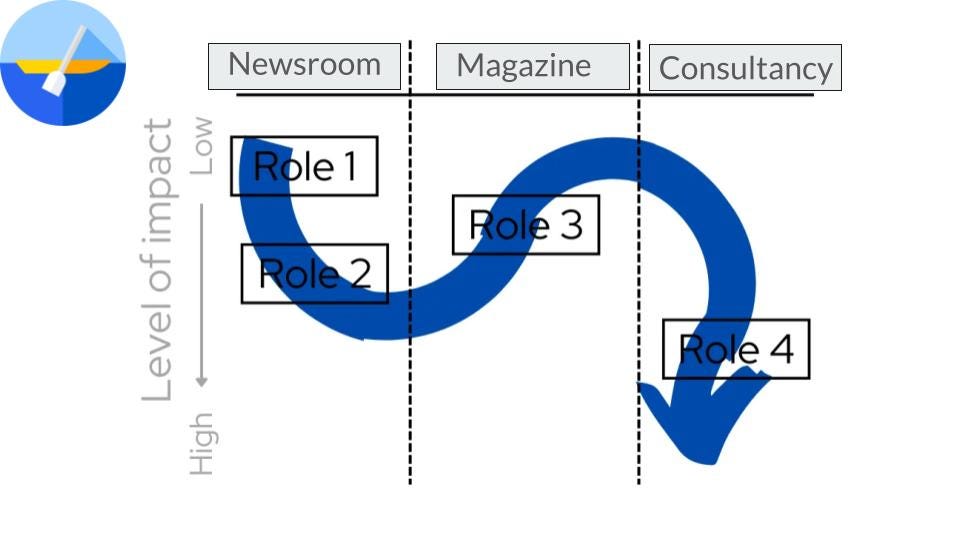Stepping back to succeed
Let’s say you’ve been cruising down your river and suddenly you encounter an obstacle. There’s a big old boulder sitting right in the middle of your path, and it came up so fast your canoe is now nudging right into it.
Would you try to push through the obstinate stone? Or would you back up and find another route forward?
When we think about it this way, it’s obvious that we’re better off backing up. But when we’re committed to the career ladder approach, taking a step back is seen as a loss. We worry about how it will look on our resume for future employers. We blame ourselves for not pushing ahead, even though there may be factors outside our control, or maybe we’re just not interested in the role on the next ladder rung.
I’m here today to tell you that backing up to move forward is not only necessary at times, it’s a key strategy to success. Just ask Steph Curry and Steve Martin.
As organizational psychologist Adam Grant describes in this interview about his book Hidden Potential, the NBA’s revolutionary point guard had to completely rehaul his shooting technique before he could claim the record for most three-pointers. And before Martin became a comedy superstar, he had to learn how to write killer one-liners instead of copying other comedians and improvising.
It’s tough to leave behind the progress we’ve made. When we’re focused on short-term losses, it’s hard to see what we could gain in the long run.
Instead of approaching our careers like a learning curve, steadily climbing ever upward, it’s more helpful to consider the advantages of “the learning pit,” where we first plunge into confusion before arriving at a eureka moment, as described by Miranda Green at the Financial Times:
“To develop resilience and mental agility, the experts argue, we must train ourselves to cope with challenges so tough that we are temporarily plunged into confusion ‘below the line.’”
Sometimes it’s only once we go backward — in our understanding, or in our careers — that we can enjoy meaningful growth.
I took a step back in my own career about 10 years ago. I had steadily ascended the newsroom ranks until I was a desk editor with 10 direct reports. I went from that job to a non-manager audience development position at a magazine publisher. Was this lower on the ladder? Sure. But it also gave me the chance to earn my master’s degree and learn business analytics. I went from that job to a consultancy role where I would work with 109 newsrooms on their audience engagement strategies.
From contributing to one newsroom to 100-plus. If you’ve tried the chart your career river exercise, you’ve seen what this looked like in terms of my impact: I had to go back to surge forward.
The ‘adaptability paradox’
Whether you’re inclined to fight, flight or “tend and befriend” when faced with danger, it’s natural to hunker down when you’re in a stressful situation.
Management consulting firm McKinsey & Company describes this phenomenon in this article: “We call this the ‘adaptability paradox’: when we most need to learn and change, we stick with what we know, often in a way that stifles learning and innovation.”
They go on to list five ways leaders can invest in adaptability, including defining your guiding purpose and building deeper, more diverse connections. In fact, it all sounds very similar to the benefits of the career river approach.
The next time you’re staring down an immovable object in your way, remember that there are benefits to taking a step back. We’re not all going to become sports or comedy legends, but we can invest in our future success by finding better paths forward.
Happy navigating,
Bridget
🔗 Links in this post:
Why succeeding sometimes involves a step backward (MSNBC)
Discover hidden themes by mapping your career river (Explore Your Career River)
Develop mental agility with a plunge into the learning pit (Financial Times)
Should We ‘Tend and Befriend’ in This Stressful Time? (U.S. News & World Report)
Future proof: Solving the ‘adaptability paradox’ for the long term (McKinsey & Company)
Freeing ourselves from the career ladder (Explore Your Career River)




